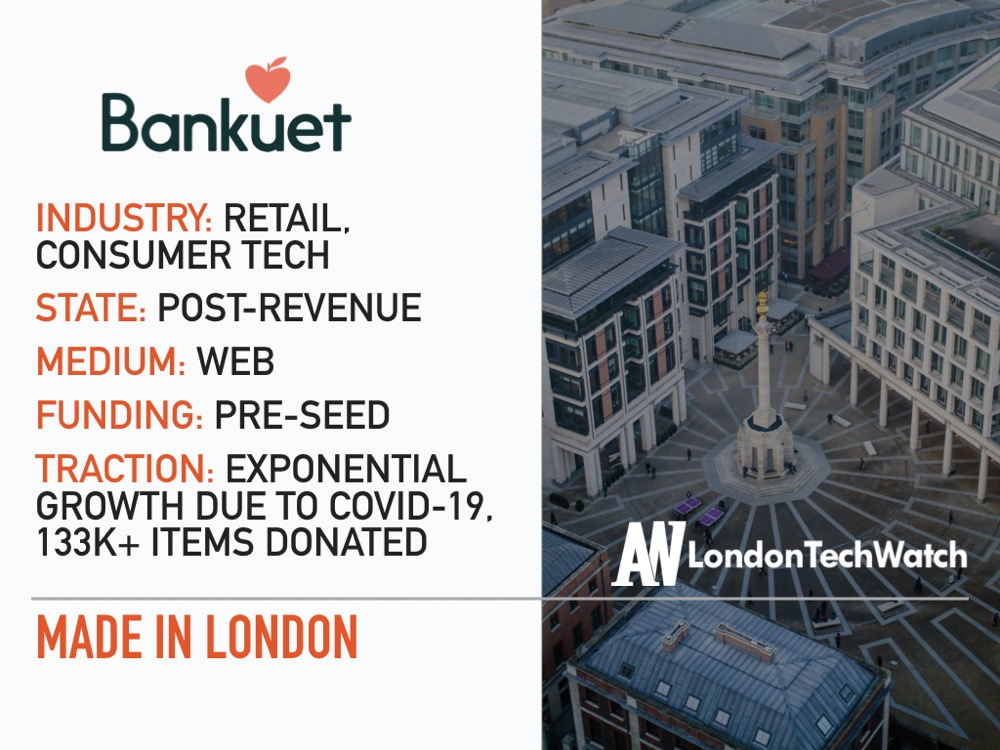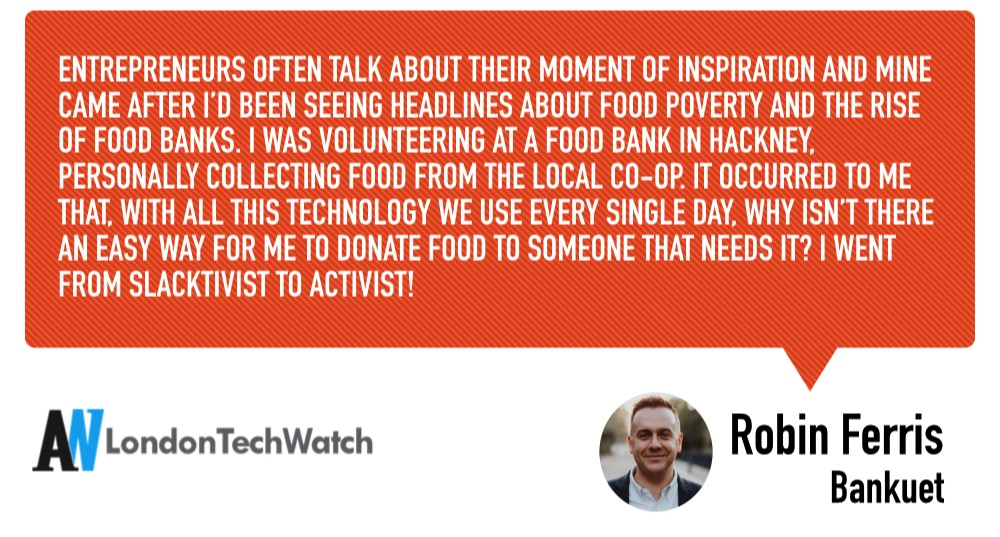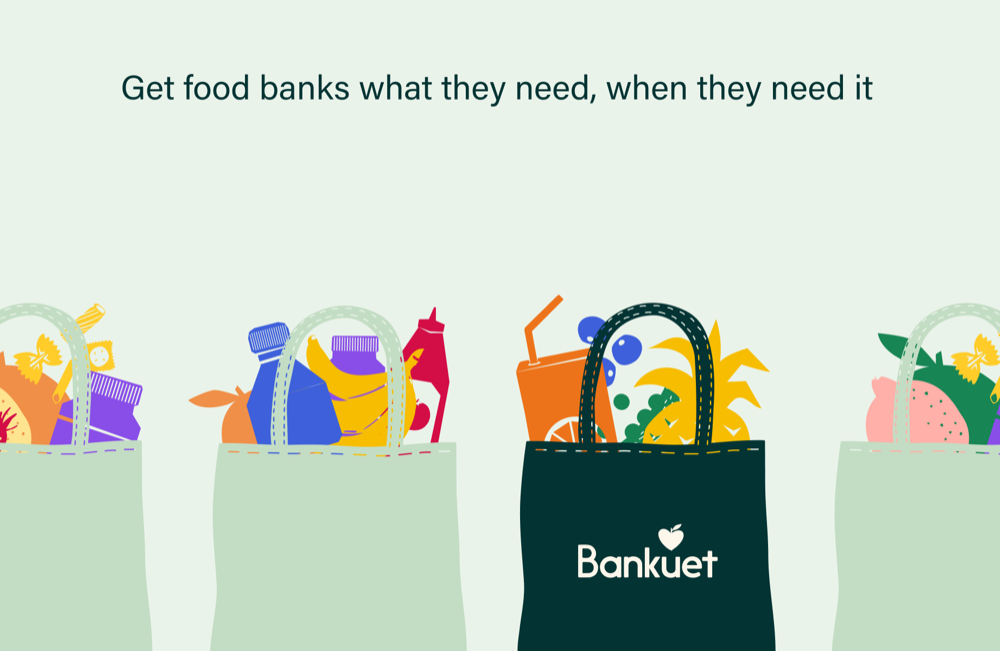Food banks have approximately three year’s worth of beans and pasta on their shelf, but in order to properly serve communities or people in need, food banks need a lot more than pantry staples. Bankuet is the London startup that makes it easy for people to donate to food banks and for food banks to get the items they actually need such as baby formula, perishables, and more. Bankuet’s platform connects donors with at least 1 of its 70 partner food banks, allowing donors to contribute money on a set scale. For example, £10 helps food banks purchase kitchen essentials whereas £50 provides a week worth’s of food for a small family. For every £10 donated, Bankuet is able to buy £12 to £13 pounds worth of food due to its partnerships with big food retailers like Morrisons, which delivered 1.9 tonnes of food via Bankuet. Throughout the pandemic, Bankuet’s platform is experiencing a surge in activity, with a 5,000% per month rise in donations, and in March alone, Bankuet fed over 3,000 people. To keep up with this demand, Bankuet’s team has expanded from a few people to over 50 volunteers.
London TechWatch caught up with CEO Robin Ferris to discuss the “lightbulb moment” behind Bankuet and Ferris’s devotion to building a zero-waste, social impact, tech startup. Since emerging from pilot mode in July 2019, Bankuet has donated 133,800 zero-waste items and fed 4,460 people.
Tell us about the product or service that Bankuet offers.
There is a hidden hunger crisis that affects more than 8 million people in the UK. Food bank numbers have gone from a handful to more than 2000 in the past decade. While some people don’t have enough to eat, others have more than they need. Busy consumers do genuinely want to help, but there hasn’t been an easy way for them to do so other than to take the time out and physically go to a supermarket. Bankuet uses familiar technology to connect those who need food with those who want to give food.
Conceptually, what Bankuet does is connect people. There are the people happy to donate food to someone who needs it, and at the other end, you’ve got someone thinking, “I probably do need food and I can’t really afford it”. We’re facilitating that connection through the conduit of a food bank.
A year ago, Bankuet was just me, a few friends, and family. We were providing a brand-new online service connecting people, who wanted to donate money, with foodbanks.
Almost a year later, we’ve found ourselves scaling up in the eye of the storm as we are the only company in the UK that is in a unique position to be able to provide help to food banks during the coronavirus pandemic.
Bankuet has been able to step in and fill the gap, organising bulk food deliveries throughout the UK.
Bankuet is the only digital platform of its kind. We use intuitive, convenient technology to enable people to go online and donate money to food banks.
It’s a reality that food banks have too much pasta and beans. I’ve been to warehouses in London where they’ve got three years’ worth of pasta and beans – and that’s just what people donate. Food banks do not have enough baby food, rice, or UHT milk to give to people in need.
Much like your weekly online shopping delivery, we negotiate with the big retailers to buy the essential items, requested in advance by the food banks. That way food banks get what they need when they need it. For every £10 pounds donated by a member of the public, we are able to buy £12 to £13 pounds worth of food – so the food banks are getting even more value.
What market is Bankuet attacking and how big is it?
There are around 2,000 known, food banks in the UK. We’ve now got more than 70 food banks being served by Bankuet, and the word is spreading.
In terms of feeding people, in our first few months, we were delighted to have fed 506 people. Now because of the pandemic and the breakdown of the supply chain to food banks, we have fed more than 3,000 people in March alone, and those figures are growing as we scale up to meet demand.
Our goal with donors is to get them to subscribe to monthly payments, so they’re regularly funding ‘Bankuet bundles’ to be sent out to food banks. At the end of 2019, 685 bundles of food had been donated. In March of this year, nearly 3,000 bundles were donated. It’s overwhelming to see the number of people that have used Bankuet to donate. I’m so humbled. People have been incredibly generous.
How has COVID-19 impacted your business?
Our business has skyrocketed almost overnight. Due to lockdown, food bank donation supply chains diminished and food banks started to run out of vital supplies. In March our donations were up month-on-month by over 5,000%. In one day, we had more food donated than we did for all of December last year. So, it’s gone utterly bonkers. We’ve had to scale all our processes very quickly, which has been great but truly overwhelming.
In January it was a tiny team, now we have more than 50 volunteers. I had to hire someone to help with PR as well because I was missing calls from the media and doing interviews. It was bonkers. But we are sticking to our plan, which is getting food banks what they need when they need it.
What is the business model?
Bankuet is a zero-waste, social impact, tech startup. We are a company with social purpose at our core. Our measure of success is how many people we can feed by shipping food banks precisely the items they need.
Our value add is for every £1 donated to a food bank via Bankuet, we deliver more than £1 worth of food to a food bank. We work closely with suppliers and retail partners to ensure we deliver the best possible value for both donors and food banks by buying in bulk. Bankuet takes a small margin from donations towards operational costs and is free to use for the first three months.
Tell us a little about your background and what inspired the business?
My background is in the entertainment industry, working through digital transformation. I’ve sat in rooms at big record labels and film companies wondering, “how on earth do we deal with this?” I went from selling CDs to retailers to managing Spotify, Blockbuster to Netflix, DVDs to iPlayer, so that’s my skill set.
Entrepreneurs often talk about their moment of inspiration and mine came after I’d been seeing headlines about food poverty and the rise of food banks. I was volunteering at a food bank in Hackney, personally collecting food from the local co-op. It occurred to me that, with all this technology we use every single day, why isn’t there an easy way for me to donate food to someone that needs it? I went from slacktivist to activist!
I got into a social impact accelerator startup programme in London, run by an organisation called Resurgo. My idea was something like a John Lewis wedding gift list. That for me was the game plan for Bankuet: let’s have the food banks tell us the wish list and let’s get it delivered when they want it.
Tell us what building your company in London has been like?
London has everything you need in order to build a company – it’s creative, there is a lot of expertise right on your doorstep, and there’s a million opportunities to network and find people who care for you and your idea. The trick is getting to know the right people to ask for advice, and not being afraid to ask them!
London can also be an isolating and lonely place, and bootstrapping a startup is financially very challenging. London is one of the most expensive cities in the world. I essentially funded myself most of last year and got into a little bit of debt, in order to pursue it. However, if you proactively seek out community and take that first step of courage, you will be surprised at how many people may want to join in and help you.
I essentially funded myself most of last year and got into a little bit of debt, in order to pursue it. However, if you proactively seek out community and take that first step of courage, you will be surprised at how many people may want to join in and help you.
What are the milestones that you plan to achieve within six months?
Within six months we aim to be working with 500+ food banks across the UK and Ireland. We are scaling fast and building out our operations and wider team so we can effectively support both donors and food banks. The better Bankuet becomes, the more people we can help.
If you could be put in touch with one person in the London Tech community who would it be and why?
Tom Blomfield and the Monzo team. I feel like it came from nowhere and now it’s everywhere. Most people I know use it. It’s a very simple mobile-led offer, has a killer brand, and a very simple proposition – giving people very simple and clear information on their spending. I love the ability to transfer funds between friends easily. Once you’ve used it you wonder why your old bank didn’t do this years ago.
What does being “Made in London” mean to you and your company?
The growth of the tech sector in London over the past few years has been phenomenal with companies like Monzo, Deliveroo, and Babylon leading the pack.
I’ve lived in London for half of my life now and have been shaped by life in this city. Working in the music business means I’ve seen first-hand how tech has completely changed some of the world’s largest entertainment companies. Living and working in London has given me a lot of experience and that has shaped the vision for Bankuet.
Before my “lightbulb” moment to form Bankuet, I volunteered at a London food bank for nearly two years. I saw first-hand the problems that not only this city faces but the individuals living in it. Especially with furloughing and people losing jobs, food banks will be needed now more than ever. It’s incredibly sad that people are going hungry in this city but it’s a fact.
It’s a privilege to be able to help food banks in London – I can see the impact Bankuet is having right in front of my eyes. It means a lot that the simple idea of Bankuet, an idea that was born on the streets of London, is now helping people here and far beyond.
It’s a privilege to be able to help food banks in London – I can see the impact Bankuet is having right in front of my eyes.
What else can be done to promote early-stage entrepreneurship in London?
If COVID-19 has taught us anything, it’s that people need people. The journey of an entrepreneur, particularly at the early stages, can be a lonely and vulnerable one. I’m fortunate to have some great family, friends, and community around me, but I’m aware that lots of people aren’t as fortunate.
There are lots of pitch events, incubator, and accelerator programmes in London, but I think there are plenty of people at the stage before that – wanting to pursue an idea but aren’t really sure where to start. I think there is a case for a “pre-incubator” incubator – somewhere to kick around ideas and not feel judged if it isn’t fully formed! It’s a bit of a myth that you need loads of money to start something – you don’t. You just need some encouragement that you’re on the right track, and then the determination and grit to go with your gut and see what happens.
What is your favorite restaurant in London?
Noble Rot Restaurant and Wine Bar on Lamb’s Conduit Street is tough to beat.
You are seconds away from signing up for the hottest list in LondonTech! Join the millions and keep up with the stories shaping entrepreneurship. Sign up today







